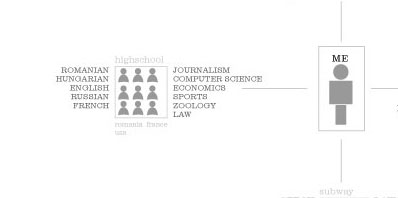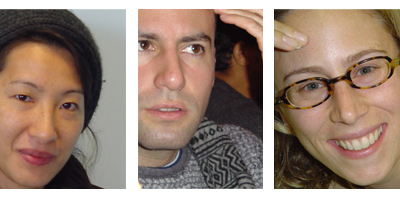|
 |
 |
friendshare
at Interaction Design Institute Ivrea |
 |
 |
 |
| Click on the picture to see a bigger preview |
 |
Mapping
As a first step, I looked at my own friends' network. I made a diagram of all my close friends from all the places I lived and worked in. I came up with 55 people I consider good friends and I am in contact with via email. They are speaking 16 languages, living in 14 countries, coming from 18 fields of study. I thought that was a great resource pool. A resource pool that more or less each of us have. |
 |
Interviewing
Although I have a great deal of friends, there were times when I needed advice and none of my friends could help me out. In many cases, a friend of a friend could be the person I am looking for. The only problem is that one cannot fully know someone else’s social network. Help is there, but it's hidden. I started looking at ways that people get help from friends of friends, and interviews some colleagues about their experiences,
I found that:
• People get help from friends of friends fairly often.
• People normally resort to close friends for help.
• Trust is a important element in recommending someone/ meeting someone for the first time.
• It's no problem to help out friends of close friends, even if you do not know them.
• Sometimes time is a problem when you have to wait for a friend to hook you up with another friend.
This is when I started thinking of an application that would reveal social resources one did not know one had, also allowing one to tap into it without an intermediary. |
 |
 |
 |
Experience prototype
I asked seven people to fill out a form with the personal data that would be required in the personal profile.
I then asked them to email me with a country of their choice where they would like to travel.
Then I went up to them with a paper copy of how the final search screen would look like and asked them for their feedback
Findings:
• people would still like the middle man if they will have a more extensive interaction with the people they looked up (like staying in their home).
• they thought a big strength of the system was that it only stretched one degree away
• it's important that there is an implicit agreement that you can contact each other's friends
• people would not mind to be contacted by friend of good friends
• one would end up sharing their personal information with about 100 people
• they would use the system 6-7 times a year
• they like the top choice idea but they would sometimes choose based on instinct
• gender, age, languages are important
• relation with link person is also important
• most used categories: places and jobs |
 |
|
 |


